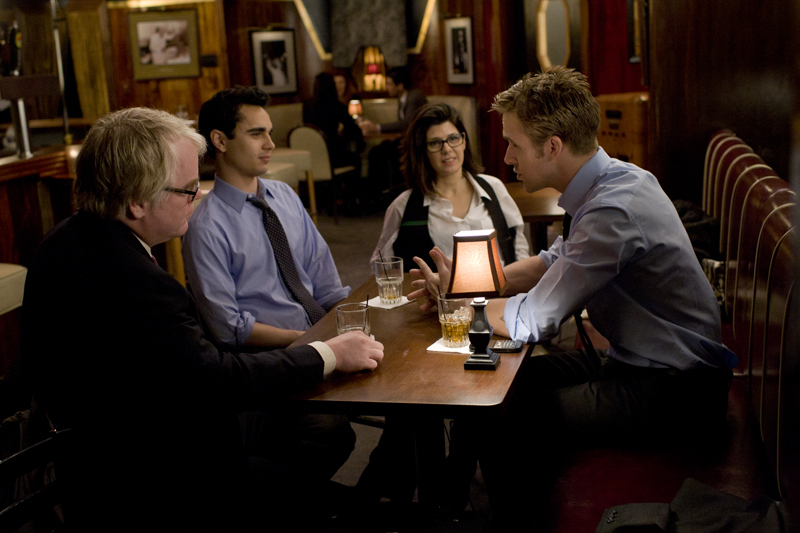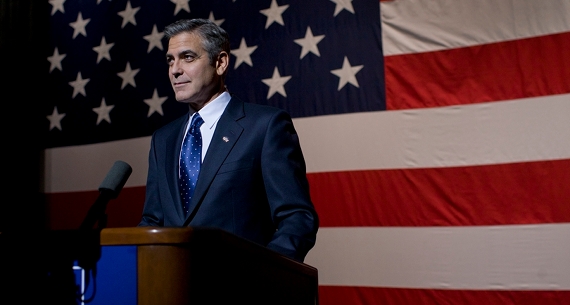|
The Ides of March
Reviewed
by
Damien Straker on
December 4th, 2011
Roadshow presents
a film directed by
George
Clooney
Screenplay
by
George Clooney, Grant Heslove and Beau Willimon, based on the play
"Farragut North" by Beau Willimon
Starring:
Ryan
Gosling, George Clooney, Philip Seymour Hoffman, Paul Giamatti, Evan
Rachel Wood, Marisa Tomei and Jeffrey Wright.
Running
Time:
101 mins
Rating:
M
Released: November 24th,
2011
|
8/10
|
|
Stephen Meyers (Ryan Gosling) is a campaign manager for
Democratic
presidential candidate Governor Mike Morris (George Clooney). He is
extremely
optimistic about Morris' progressive values and says that he will
support
anything as long as he believes it. Stephen is employed under the watch
of Paul
(Philip Seymour Hoffman), who values loyalty most and is precariously
trying to
sway a senator (Jeffrey Wright) for his support so that they can take
the crucial
state of Ohio. Friction arises when Stephen has talks with rival
democrat
campaigner Tom Duffy (Paul Giamatti), who wants to hire him and promote
his own
candidate. This meeting is somehow traced by a hungry reporter in Ida
(Marisa
Tomei). Meanwhile, Stephen becomes loosely involved with Molly (Evan
Rachel
Wood), who is also hiding something.

Despite the enormity of the cast, The Ides
of March is a modestly produced and tautly written
political thriller. It throws us into the deep end of American politics
and for
outsiders this can be daunting. This is because much of the dialogue in
the
film, though occasionally witty and funny, is also highly loaded. It is
essential to read between the lines here and that leaves us on the
outskirts
from many of these ambiguous characters. The detail placed on single
lines of
dialogue remains purposeful and requires our full attention. When
Stephen asks
how old a character is there are more subtle implications as they suss
and test
each other out. Accurately, it reminds us of how cautiously people in
this
domain have to tread in both their public and private lives. The battle
is here
not fought between conflicting parties of opposition but the single
regime of
the Democrats. It is ironic to see such infighting because we know they
will
present a united front to the public come the Presidential election.
The facade
of the characters is reflected through the film's subtle aesthetic
design. Many
scenes, such as the opening in a hall and a late confrontation in a
restaurant,
are cast in deep shadows. It gives the film and the characters a
classic noir
feel of mistrust and uncertainty. Contrastingly, day time scenes are
photographed
down long, cold brick corridors or behind panes of glass, contributing
a sense
of a highly isolated work environment. Towards its script and its
design, this
is a very delicately made film.

Although the start of the film is distancing and cold, a
clever
twist in the plot sees the narrative hit its straps. From this point
the film
becomes deeply entrenched with human power plays of loyalty, friendship
and
expendability. Due to the flawless casting and performances many of the
intense
confrontations, particularly late in the film, are of the highest
order.
Gosling has proven that this year that he has the range to not only
play any
type of role but to sustain his work at such a consistently high and
entertaining level. He's exceptional again, with his role closer to the
one he
played in Half Nelson, as a man who
is gradually deteriorating from the inside out. As Stephen's status
gradually
declines, the apparentness of his fear makes the performance human and
compelling. Clooney again finds a way to tap into his own celebrity
image
because beneath the smiles and sincerity of his character is someone
dark and
entirely ruthless. The force in both of their performances peaks during
a
riveting showdown that reaches palpable levels of tension. Giamatti and
Hoffman
are in fine touch but Evan Rachel Wood holds her own too as the most
vulnerable
kind of damsel in distress. Closing the film is an ending that is part
Shakespearean
tragedy, hence the title taken from "Julius Caesar", but also Faust
as well. It does not reach a high emotional peak but it's still a
straight
reminder of how quickly people are willing to sell their own moral and
ethical
values. We already knew that and it will not change the world but as
long as
cinema returns to a mature state of reminding us of the failure of
human
nature, like it does here, we're happy.
|